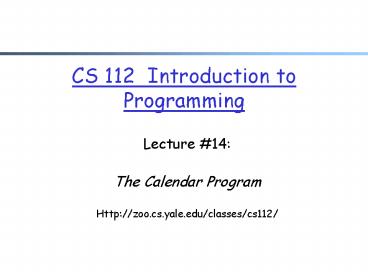CS 112 Introduction to Programming - PowerPoint PPT Presentation
1 / 16
Title:
CS 112 Introduction to Programming
Description:
CS 112 Introduction to Programming ... Calculate the weekday of the 1 days of a month (in a specific year) static void IndentInitialWeekdays( int weekday ) ... – PowerPoint PPT presentation
Number of Views:80
Avg rating:3.0/5.0
Title: CS 112 Introduction to Programming
1
CS 112 Introduction to Programming
- Lecture 14
- The Calendar Program
- Http//zoo.cs.yale.edu/classes/cs112/
2
Outline
- Admin. and review
- Stepwise refinement using the Calendar program as
an example
3
Admin.
- Assignment 2 office hours
- 1200 PM - 500 PM (DL 120)
- 0230 PM 400 PM (AKW 202)
- 0500 PM 630PM (DL 120)
4
Recap Variable Scope and Duration
- Scope
- A local variable is accessible after it is
declared and before the end of the block - A class variable is accessible in the whole class
- Parameter passing with ref and out makes some
variables aliases of others - Duration
- A local variable may exist but is not accessible
in a method, - e.g., method A calls method B, then the local
variables in method A exist but are not
accessible in B.
5
Example
class Test const int NoOfTries 3 //
class scope static int Square ( int x ) //
formal arg. // NoOfTries and x in
scope int square x x // square local
var. // NoOfTries, x and square in scope
return square static int
AskForAPositiveNumber ( int x ) //
NoOfTries and x in scope for ( int i 0
i lt NoOfTries i ) // NoOfTries, i,
and x in scope string str
Console.ReadLine() // NoOfTries, i, x,
and str in scope int temp
Int32.Parse( str ) // NoOfTries, i, x,
str and temp in scope if (temp gt 0)
return temp // now only x and
NoOfTries in scope return 0 //
AskForPositiveNumber static void Main(
string args )
6
Review Program Development Process
7
Calendar Requirements
- Get a year from the user, the earliest year
should be 1900 - Get a month from the user, the input should be
from 0 to 12 - If 0, print calendar for all 12 months
- Otherwise, print the calendar of the month of the
year
8
Design
year GetYearFromUser()
month GetMonthFromUser()
month ? 0
t
f
PrintMonth(month, year)
PrintYear(year)
9
PrintMonth( month, year )
- January 1900
- Sun Mon Tue Wed Thu Fri Sat
- 1 2 3 4 5 6
- 7 8 9 10 11 12 13
- 14 15 16 17 18 19 20
- 21 22 23 24 25 26 27
- 28 29 30 31
10
Design PrintMonth( month, year )
Print month header
GetFirstWeekday(month, year)
IndentInitialWeekdays
GetMonthDays(month, year)
Print each day
11
Design PrintMonth( month, year )
Print month header
GetFirstWeekday (month, year)
IndentInitialWeekdays
GetMonthDays(month, year)
Print each day
12
Implementation
- Important
- Implement simple methods first
- Test a method
- using some dummy method calls, or
- e.g, Call the method in Main() with some typical
test cases - using Visual Studio Immediate window
13
Methods To Be Implemented and an Order to
Implement them
- static string GetMonthName( int month )
- // The English word for a specific month
- static bool IsLeapYear( int month, int year )
- // Check if a year is a leap year
- static int GetMonthDays( int month, int year )
- // Calculate the number of days for a specific
month of a specific year - static int GetFirstWeekday( int month, int year
) - // Calculate the weekday of the 1 days of a
month (in a specific year) - static void IndentInitialWeekdays( int weekday )
- // Indenting the first line so that the
first day appears in the correct position - static void PrintMonth( int month, int year )
- static void PrintYear( int month, int year )
- static void GievInstructions( int month, int year
) - static void GieYearFromuser( int month, int year
) - static void GetMonthFromUser( int month, int year
) - static void Main( string args )
14
Example Implementing GetMonthName
- static string GetMonthName(int month)
- switch (month)
- case 1 return ("January")
- case 2 return ("February")
- case 3 return ("March")
- case 4 return ("April")
- case 5 return ("May")
- case 6 return ("June")
- case 7 return ("July")
- case 8 return ("August")
- case 9 return ("September")
- case 10 return ("October")
- case 11 return ("November")
- case 12 return ("December")
- default return ("Illegal month")
- // end of method GetMonthName
static void Main( string args )
Console.WriteLine( GetMonthName( 1 ) ) //
end of method Main
Test
15
Example Implementing IsLeapYear
- static bool IsLeapYear(int year)
- return ( (year 4 0) (year 100 ! 0)
) - ( year 400 0)
- // end of method IsLeapYear
static void Main( string args )
Console.WriteLine( IsLeapYear( 2000 ) )
Console.WriteLine( IsLeapYear( 1900 ) )
Console.WriteLine( IsLeapYear( 2003 ) ) // end
of method Main
16
Example Implementing GetMonthDays
- static int GetMonthDays(int month, int year)
- switch ( month )
- case 2
- if ( IsLeapYear( year ) )
- return ( 29 )
- else
- return ( 28 )
- case 4 case 6 case 9 case 11
- return ( 30 )
- default
- return ( 31 )
- // end of switch
- // end of method GetMonthDays
static void Main( string args )
Console.WriteLine( GetMonthDays( 2, 2000 ) )
Console.WriteLine( GetMonthDays( 2, 1900 ) )
Console.WriteLine( GetMonthDays( 6, 2003 )
) // end of method Main































